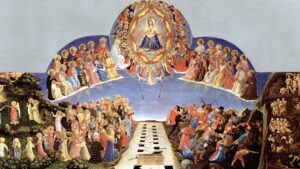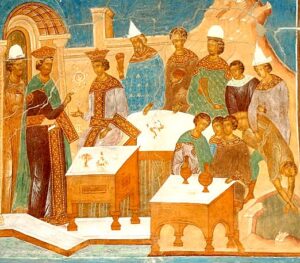
Christ is risen! Truly He is risen!
 “Here’s how we do it. We visit people, and we ask ‘Do you want to be sure you’re going to Heaven?’ Most of them say ‘Yes’. Then we say: ‘Just recite these words: “I accept Jesus Christ as my personal Lord and Savior”, and you can be sure you’re going to Heaven.”
“Here’s how we do it. We visit people, and we ask ‘Do you want to be sure you’re going to Heaven?’ Most of them say ‘Yes’. Then we say: ‘Just recite these words: “I accept Jesus Christ as my personal Lord and Savior”, and you can be sure you’re going to Heaven.”
That was what a man from a “Bible church” told me some years ago. I was so shocked, all I remember saying was: “That isn’t quite the way we do it.” The man is now Orthodox – no thanks to me!
I envy people who are sure they’re going to Heaven – considering that Saint Paul himself felt no such assurance. He wrote that in the “race” for salvation which God had assigned to him, he ran hard, “lest, when I have preached to others, I myself should become a castaway.” 1 Corinthians 9:27 Only at the very end of his life, when he knew martyrdom soon awaited him, and he could do no more, did Saint Paul feel assured: “I have fought the good fight, I have finished the race, I have kept the faith. Finally, there is laid up for me the crown of righteousness, which the Lord, the righteous Judge, will give to me on that Day.” 2 Timothy 4:7-8
The man above was onto something. Believing in Jesus is central. I pray every night “Lord Jesus, please save me”. However, as we Orthodox understand it, and as the Holy Scriptures describe it, there’s a whole lot more to salvation than saying a few words.
“Being saved”

Here’s a minimal understanding: Just a year ago, my wife and I were planning to move. Our daughter and son-in-law came down from Minneapolis, and we spent several days going through all the stuff we had accumulated during our fifty six years of marriage and nearly thirty years in the same house. Some of it we got rid of, and some of it we “saved”. * At the Final Housecleaning, some people will be saved, and some will not.
- At the last minute we chickened out and didn’t move. Many of our small belongings are still in boxes in the garage. We haven’t needed them in a year, indicating that we should have got rid of more. I hope Jesus never feels that way.
I understand (I’m no Greek scholar) that the New Testament Greek words for “save” (σῴζω /sōzō) and “salvation” (σωτηρία / (sōtēria) mean more than just making it over the finish line. They have overtones of wholeness, fullness, health, becoming the kind of people God created us to be. More about this later.
The Narrow Gate
Modern superstition has it that everybody automatically goes to Heaven. Death gives you the card which reads: “Advance to Go and collect $200”. *
- That’s from the old game of Monopoly. Do people still play it?
Some more theologically-minded people believe in “universal salvation”, that finally all will be saved -perhaps even the devil himself – reasoning that at the End who will be able to resist God and His love? We may hope for that. We may pray for that. Certainly it is theoretically possible. But according to Jesus, that is not what is going to happen.
Here is what Jesus Christ taught:
 “Enter by the narrow gate; for wide is the gate and broad is the way that leads to destruction, and there are many who go in by it. Because narrow is the gate and difficult is the way which leads to life, and there are few who find it.” Matthew 7:13-14 That’s scary. “Being saved” is not easy, not simple, and above all not cheap.
“Enter by the narrow gate; for wide is the gate and broad is the way that leads to destruction, and there are many who go in by it. Because narrow is the gate and difficult is the way which leads to life, and there are few who find it.” Matthew 7:13-14 That’s scary. “Being saved” is not easy, not simple, and above all not cheap.
What is the “narrow gate”? Different kinds of Christians give different answers.
Is the narrow gate a kind of “conversion experience”?
Some “Bible church” Protestants teach that being “saved” requires an emotional experience of some sort, when by the grace of God people turn from error and consciously give their hearts to Jesus * – an identifiable time and place when they were “saved”. Some say that without this experience, people can’t go to Heaven. They will ask faithful Orthodox “When were you saved?” and are very disappointed when they discover that some of us haven’t been, according to their understanding, have not had that single life-altering, direction-changing experience. And, of course, some of us have, some of us more than once.
- A good thing. Never knock it.
Is the narrow gate “correct Ecclesiastical Identity”?

Some hold that, in order to be saved, people must belong to the right Church. This doctrine is disavowed by most Roman Catholics today, but in 1441 Pope Eugene IV in the Bull “Cantate Domino” taught (apparently not infallibly): “The Most Holy Roman Church firmly believes, professes and preaches that none of those existing outside the Catholic Church, not only pagans, but also Jews, heretics, and schismatics can ever be partakers of eternal life, but that they are to go into the eternal fire ‘which was prepared for the devil and his angels’ (Mathew 25:41) unless before death they are joined with her.”
Several years ago I made friends with very nice woman who belongs to the Wisconsin Evangelical Lutheran Synod (WELS), who are so strict that they’re not allowed even to pray with other Lutherans. * She told me she was really upset that so many of her family and friends (and obviously me! though she kindly didn’t say that) were going to burn in hell, I guess because they weren’t WELS.
- Keep in mind that today’s Lutheran synods range from WELS to the extremely liberal (ELCA) to Missouri Synod which is conservative but starting to slip, from what I hear.
And of course, in a much broader sense, we Orthodox and Roman Catholics see Holy Baptism as the normal first step in the road the Salvation, giving us our identity as Christians, members of the Body of Christ. However, we certainly do not try to limit His work to the visible Orthodox Church.
Is the narrow gate belief in Jesus Christ?
Yes, Belief in Jesus Christ, having Jesus Christ as “Lord and Savior”, is clearly necessary. The New Testament could not be more clear about it.
“For God so loved the world that He gave His only begotten Son, that whoever believes in Him should not perish but have everlasting life.” John 3:16

“But these [words] are written that you may believe that Jesus is the Messiah, the Son of God, and that by believing you may have life in his name.” John 20:31
“I am the way, the truth, and the life. No one comes to the Father except through Me.” John 14:6
I’m sure you know how hard Saint Paul fought to win the Apostolic judgment that faith in Christ was the only requirement for Gentile converts. Acts 15
However, as we said before, intellectual belief alone won’t get us in. Listen to the Apostle James, making that point: “You believe that there is one God. You do well. Even the demons believe—and tremble!”
What about those who do not believe in Christ? As we read the New Testament, those who know Jesus Christ and consciously, intentionally reject him are in trouble. Only God knows who those people are. We do not, and it’s none of our business to try to judge.
Is the Narrow Gate correct behavior?
The New Testament is filled with commands to “love our neighbors as ourselves”, stated in various ways so numerous I won’t bother to quote any of them here, except for the Great One in Matthew 25:31-46 to which, as you know, I return again and again. If you don’t know it, please read it.

Here Christ set forth only one requirement for salvation: to care for the hungry, the thirsty, the strangers, the naked, the sick, those in prison. Those who did so had served Christ Himself, whether they knew it or not, and so were welcomed into the Kingdom prepared for them. As for those who did not care for needy people: “depart into the fire prepared for the devil and his angels”.
This could not be more clear.
As I’ve written often before, this parable of Our Lord’s answers two big questions: 1 Can non-believers be saved? Yes because at the Final Judgment, there will be no non-believers. All will see Our Lord Jesus Christ for Who He is and will believe. 2 The Judgment will be solely on peoples’ behavior. Did we have love for others? Thus “Many [former non-believers] will be first, and many [who had only appeared to be believers] will be last.”
Jesus set forth only that one requirement..
So we’re judged by our behavior. But how can that get us in? For God knows and we know that none of us are wholly filled with love and always care for others.
Here’s a popular way out, another very primitive approach: At the End if we’ve been 70% (or whatever) good, in we’ll go. But only 69% (or whatever) good, and it will be “Sorry. Goodbye.” So just try to be 70% good, folks, and then maybe tell God you’re sorry, and you’ll be ok.
I don’t think so.
Christ taught: “You must be perfect, even as your Father in Heaven is perfect.” Matthew 5:48
Is the Narrow Gate Obedience to God?
Here’s the approach C.S. Lewis took in his book The Great Divorce *:

“There are only two kinds of people in the end: those who say to God, ‘Thy will be done,’ and those to whom God says, in the end, ‘Thy will be done.’ All that are in Hell, choose it. Without that self-choice there could be no Hell. No soul that seriously and constantly desires joy will ever miss it. Those who seek find. To those who knock it is opened.”
- For any who don’t know, The Great Divorce is not about the marriage divorce rate but about the the Final Separation between those who go to Heaven and those who go to hell.
But this, perfectly stated as it is, still leaves us hanging. Who among us always chooses the will of God? Who among us always follows Christ? Not the author of this Blog, believe me. And not the person who is reading this Post. Nor was the author in The Great Divorce, as he made quite clear.
Judging by the standards above, it looks like the only person who has ever been saved, who has ever deserved salvation, is Mary the Mother of God.
Are we prepared for Salvation?
Here’s another problem:

Would I even want to enter the gates of Heaven in my present condition? You know Christ’s parable of the Heavenly Banquet in Matthew 22, where a man shows up “not wearing a wedding garment” and gets thrown out into the “outer darkness”. That would be you and me, sinners that we are, if we arrived in Heaven now. C.S. Lewis wrote (I paraphrase) that if he (CSL) showed up at a grand party dressed in his “grubbies”, with all the other guests dressed elegantly, and the host said “Come on in, anyway”, he would reply, “Please, sir, I’d rather get cleaned up first.” Yes.
An anonymous Orthodox Post-Communion prayer reads: “And thus, when I depart this life in the hope of eternal life, may I attain everlasting rest, where the sound of those that keep festival is unceasing, and the delight of those who behold the ineffable beauty of Your countenance is unending.”
That sounds wonderful beyond imagining. But would I fit in there now? I don’t think so. Not yet.
And to see Jesus Christ, face to Face, His Glorious Face… Some people can hardly wait to get to Heaven and say hello to Jesus. I believe I once, many years ago, had a brief glimpse of the Face of Jesus. It has shaped my life ever since. It was so beautiful, so full of love and compassion, so “heavy” that… I don’t think I could handle any more of Him. Not now. Not yet.
But Christ came to save us all, we who at death are not ready.
What is the way out of this conundrum? How can we be saved? There is an answer, and not surprisingly, the Holy Orthodox Church knows what it is. * And Orthodoxy offers more, far more, than what people usually mean by “being saved”. We’ll come to that.
- So does the Roman Catholic Church, though in a negative way.
Not yet… but someday.

Here’s the key: God gives us more time than we have here. This life on earth is the very beginning of the project of bringing us to Salvation, to perfection, to become the persons He created us to be, filled with love and joy. If we’re still “hanging in here” with Christ and His Church till the end of our lives – still trying, haven’t given up – then when we die, we “pass on”, advance to the next “room” of Our Father’s House John 14:2 , where the process continues. I like to misquote the popular hymn: “When we’ve been there ten thousand years…we’ll still just be getting started.”
Roman Catholic Church dogma expresses this idea negatively (though some are de-emphasizing it now): When faithful people die, they go “down” to Purgatory, a place of fiery punishment where they pay the price of their sins, then eventually are released to go to Heaven.
In the Orthodox view, the process is chiefly positive. Our growth in holiness and goodness will continue after our deaths. Will leaving our sins behind be painful? Yes, just as it was on earth. But, as Saint Gregory of Nyssa described it, it will chiefly be rising: “from glory to glory advancing”.
But wait. There’s more – and better, far better.
Theosis
“Beloved, now we are children of God; and it has not yet been revealed what we shall be, but we know that when He is revealed, we shall be like Him, for we shall see Him as He is”. I John 3:2
“…His divine power has given to us all things that pertain to life and godliness, through the knowledge of Him who called us by glory and virtue, by which have been given to us exceedingly great and precious promises, that through these you may be partakers of the divine nature…” 2 Peter 3:4
We shall be like Him… be partakers of the divine nature. Almost incredible ideas, written by John and Peter without explanation, as if everybody knows about it.
The technical term for this is Theosis (θέωσις), Deification – the process of transformation by which, through the grace of God and in union with Him, we human beings become like Him, we caterpillars turn into butterflies. Certainly we do not become like God in His inaccessible Essence, but we become in every other way like Our Lord Jesus Christ – like Him * in His character, full of love and compassion and joy. And when we become like that, then we will be able to see Him as He is.
- In the General Resurrection, will “the righteous” be like Christ in His Resurrection? not limited by time and space, able to appear and disappear at will? Interesting questions! But those are side-issues.

Here is the important thing: Since there is no end to our infinite God, there will always be more of God to love and to know. And because He is eternal, that is why we, like Him, will have eternal life.
I’m again going to quote C.S. Lewis, who once again understands it. (That man was so orthodox.Why was he not Orthodox?)
At the end of the last book of his Chronicles of Narnia * as the children are moving ever upward into “Aslan’s Country”, their leader Peter calls out over and over again, “Further up and further in!”
- Children’s books, which are not only for children, where the Great Lion “Aslan” is the Christ figure.
“Are you saved?”
Yes, indeed. And should we, by the grace of God, make it into “God’s Country”, we will continue being saved, further up and further in, now and ever and unto the ages of ages. Amen.
Next Week: A Sermon: “Arise”
Week after Next: Don’t know yet.
Thank you for this post, it really clarifies for me the concept of “being saved.” One time I heard an Orthodox priest say that he responded to the question “Have you been saved?” by saying “I’m in the process of being saved.” That made a lot of sense to me, too.
Have you ever read the poem “When Earth’s last picture is painted” by Rudyard Kipling? I would be interested to know your thoughts about this poem, if you would share them. Lord bless!
At your suggestion, I read Kipling’s poem. Perfect eternal retirement for a painter. May I hope that something like that is in store for us writers?
All praise and glory to God.
Well written, broad in scope and coming to the finest point.
Christ IS risen. He Lives in deed!
Thank you. Incidentally, you remind me that I forgot to begin the Post with “Christ is risen!”. I’ll correct that immediately.